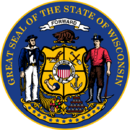Manitowoc County Municipal Court, Wisconsin
| Local Courts |
|---|

|
| Trial courts and judges |
| Elections by state |
| Judicial selection by state |
| View courts by state: |
Ballotpedia provides comprehensive election coverage of the 100 largest cities in America by population as well as mayoral, city council, and district attorney election coverage in state capitals outside of the 100 largest cities. This page is outside of that coverage scope and does not receive scheduled updates.
The Manitowoc Municipal Court resides in Wisconsin. Click on the links below to learn more about the court's...
Jurisdiction
This court holds the following jurisdiction:[1]
| “ | The majority of municipal court cases involve traffic, parking, and ordinance matters, including first-time drunken driving offenses. Juvenile matters, such as truancy, underage drinking, drug offenses and curfew violations are also a significant part of municipal court caseloads. The laws governing municipal courts include Wisconsin Statutes Chapter 800, Municipal Court Procedure and Wisconsin Statutes Chapter 755, Municipal Court (external links). ...
Municipalities may join together to form one court. The contracting municipalities need not be contiguous or even in the same county. Any number of municipalities may join and voters in all the municipalities elect the judge.[2] |
” |
Selection method
- See also: Judicial selection in the states
- See also: Nonpartisan election of judges
Judges of the Wisconsin Municipal Courts are chosen in nonpartisan elections. They serve four-year terms that begin on May 1, though local ordinances may override that term length.[3][4] Eligibility requirements vary from court to court, with some municipalities requiring judges to have law degrees, but all judges must participate in a continuing judicial education program.[5]
Judicial elections in Wisconsin
- See also: Wisconsin judicial elections
Wisconsin is one of 12 states that uses nonpartisan elections to select judges and does not use retention elections for subsequent terms. To read more about how states use judicial elections to select judges across the country, click here.
Primary election
A primary is held on the third Tuesday in February to nominate judicial candidates for the spring election. Candidates seeking election must file by the first Tuesday in January preceding the spring general election.[6] A primary is required if more than two candidates file for nomination to the supreme court, the same district of an appellate court, or for the same branch of a circuit court.[6] If the number of candidates for office does not exceed twice the number to be elected to the office a primary is not held and all the candidates will appear on the ballot in the spring election.[6] The two candidates who receive the most votes in a primary race advance to the general election.[7]
General election
A spring election is held on the first Tuesday in April.[6]
See also
External links
Footnotes
- ↑ Wisconsin Court System, "Municipal courts - Established by Wisconsin cities, villages, & towns," accessed May 23, 2023
- ↑ Note: This text is quoted verbatim from the original source. Any inconsistencies are attributable to the original source.
- ↑ Wisconsin Court System, "Municipal Court Overview," accessed September 26, 2014
- ↑ Wisconsin State Legislature, "Municipal Court, Sec. 755.02," accessed September 26, 2014
- ↑ American Judicature Society, "Methods of Judicial Selection: Wisconsin; Limited Jurisdiction Courts," archived October 3, 2014
- ↑ 6.0 6.1 6.2 6.3 Wisconsin Legislative Council, "Overview of the Election Law in Wisconsin," archived March 31, 2014
- ↑ American Judicature Society, "Methods of Judicial Selection: Wisconsin," accessed March 31, 2014
Federal courts:
Seventh Circuit Court of Appeals • U.S. District Court: Eastern District of Wisconsin, Western District of Wisconsin • U.S. Bankruptcy Court: Eastern District of Wisconsin, Western District of Wisconsin
State courts:
Wisconsin Supreme Court • Wisconsin Court of Appeals • Wisconsin Circuit Courts • Wisconsin Municipal Courts
State resources:
Courts in Wisconsin • Wisconsin judicial elections • Judicial selection in Wisconsin





